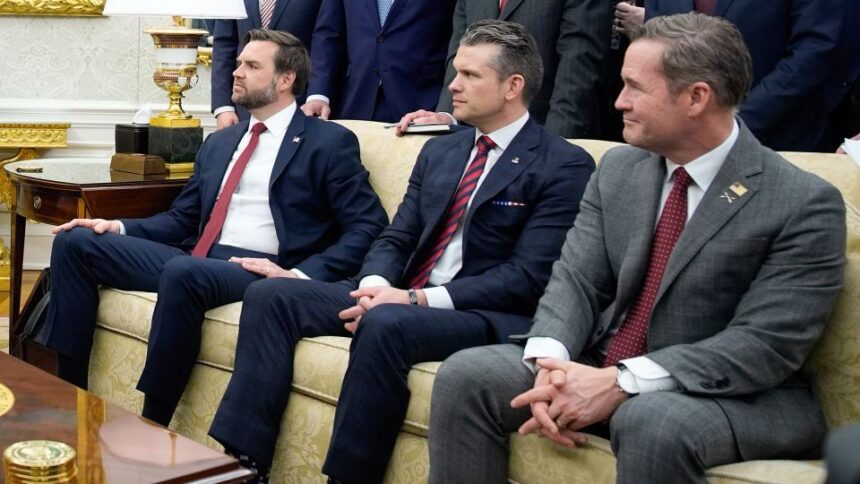Top officials in Donald Trump’s administration mistakenly included a journalist in a group chat discussing highly sensitive U.S. military strike plans against Houthi militants in Yemen, according to a bombshell report by The Atlantic.
The messages, exchanged on the encrypted app Signal, contained operational details of forthcoming airstrikes, prompting shock and concern among national security experts.
The chat was convened earlier this month by Trump’s national security adviser, Mike Waltz, and included Vice President JD Vance, Defense Secretary Pete Hegseth, and Secretary of State Marco Rubio. But in what appears to be a catastrophic blunder, The Atlantic’s editor-in-chief, Jeffrey Goldberg, was also added to the conversation.
According to the report, the group discussed when to launch the strikes, with Goldberg quietly observing before ultimately removing himself from the thread. The strikes were later carried out, and participants in the chat congratulated one another on a “job well done.”
The Trump administration has acknowledged the messages are likely authentic but has yet to explain why such a high-level discussion occurred outside secure government communication systems. Senior officials immediately began reviewing the use of Signal amid fears that reliance on the app for sensitive matters poses serious national security risks.
Reactions within the Trump administration ranged from disbelief to outright panic. Several officials privately admitted to CNN that they were stunned by the revelations, with at least two speculating that the mistake could lead to a high-profile firing. Career national security officials were particularly disturbed, noting that if a lower-ranking employee had engaged in such conduct, they would likely face termination and possible prosecution.
Despite this, Hegseth downplayed the controversy, dismissing allegations that the group had shared classified war plans over text. “Nobody was texting war plans, and that’s all I have to say about that,” he told reporters upon arriving at Joint Base Pearl Harbor-Hickam in Hawaii. However, the Trump administration’s previous acknowledgment of the messages’ authenticity contradicts his statement.
Signal is widely used by journalists and government officials alike for secure messaging, but its use for discussing military operations—some of the most closely guarded national secrets—was deemed reckless by security experts. The U.S. government has secure classified communication systems, including the Secret Internet Protocol Router Network (SIPRNet) and the Joint Worldwide Intelligence Communications System (JWICS), which the officials involved had access to.
Former Defense Secretary and CIA Director Leon Panetta condemned the blunder, stating, “They broke every procedure known to man about protecting operational material before a military strike.” He warned that had Goldberg been a hostile actor instead of a journalist, the information could have been used to tip off Houthi forces, endangering American troops.
The incident has raised serious legal questions, including potential violations of the Espionage Act, which criminalizes the mishandling of national defense information. Under normal circumstances, such a breach would trigger an FBI investigation. However, given that the individuals involved hold the authority to classify or declassify material, an inquiry is unlikely.
The political fallout has been swift. While some Republicans downplayed the situation, Senator John Cornyn called it a “huge screw-up,” while Democratic lawmakers expressed outrage. Congressman Jim Himes, the ranking Democrat on the House Intelligence Committee, signaled his intention to press intelligence officials about the matter in an upcoming hearing.

Trump, for his part, appeared to deflect responsibility when questioned about the incident. “I don’t know anything about it,” he told reporters, before launching into an attack on The Atlantic, calling it a “magazine that’s going out of business.” However, sources say he was furious when briefed on the report, particularly over the fact that Goldberg—a longtime critic—was the journalist mistakenly included.
The blunder has reignited debates over the Trump administration’s handling of sensitive information. Critics have pointed out the irony of Rubio’s involvement, given his past criticism of Hillary Clinton’s use of a private email server for government business. “Hillary Clinton put some of the highest, most sensitive intelligence information on her private server… This is unacceptable. This is a disqualifier,” Rubio said in 2016.

For now, no firings have been announced, but the White House is reviewing its internal communication protocols. Whether this mistake will have long-term consequences for Trump’s national security team remains to be seen.







